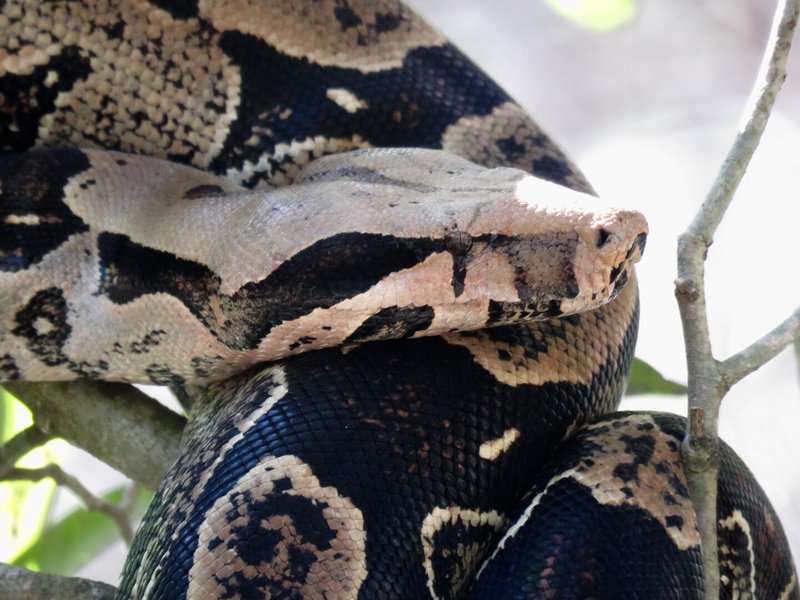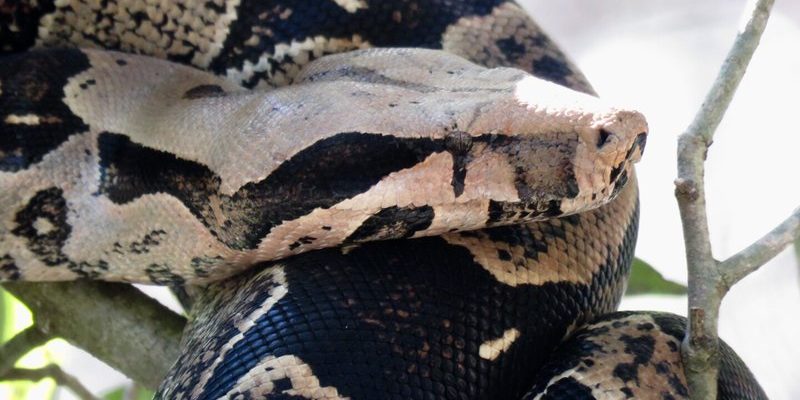
Boa constrictors are large snakes that are native to Central and South America. They primarily hunt small mammals and birds, using their strong bodies to squeeze their prey. This impressive hunting method can make it seem like they pose a danger to humans. But don’t let the size fool you—there’s more to the story. Understanding their behavior, habitat, and interactions with humans can offer some clarity on this topic.
In this article, we’ll look at various aspects of the boa constrictor’s nature, their behavior towards humans, and what you should know if you ever find yourself in the presence of one of these powerful snakes.
Understanding Boa Constrictor Behavior
To assess the danger a boa constrictor might present to humans, it’s essential to understand its behavior. These snakes are generally non-aggressive and prefer to avoid conflict. Think of them as the introverts of the snake world; they’d rather keep to themselves than engage in any confrontation.
One interesting aspect of their behavior is that boa constrictors are primarily nocturnal, which means they are most active at night. During the day, they often rest in trees or undergrowth. If you encounter one during its active hours, it’s likely that it’s more interested in finding food than bothering you.
Additionally, whenever a boa constrictor feels threatened, it tends to rely on its ability to camouflage itself rather than attack. They blend beautifully into their surroundings, making them hard to spot. So, if you’re hiking through a rainforest, spotting one of these snakes isn’t as easy as it sounds!
Are Boa Constrictors Venomous?
You might be relieved to know that boa constrictors are non-venomous. Unlike some of their snake cousins, they don’t have fangs filled with toxins to deliver a painful bite. Instead, they rely on their strength to constrict and suffocate their prey. This is a comforting thought—after all, a snake without venom can seem much less dangerous, right?
However, that doesn’t mean they can’t bite. Boa constrictors have teeth designed for gripping and holding onto their prey. If they feel cornered or threatened, they might bite defensively. While these bites can be painful and cause bruising, they rarely pose a serious medical threat to a healthy adult human.
In the event of a bite, it’s crucial to remember that keeping calm is key. Cleaning the wound and seeing a doctor is always a good idea to prevent infection, but serious complications are uncommon.
When Boa Constrictors Attack
While it’s rare for boa constrictors to attack humans, there have been a handful of incidents reported. These typically occur in situations where the snake feels threatened or provoked. Imagine a scared dog barking at a stranger—boa constrictors can react similarly when they feel cornered. Here’s what you should know:
- Provoked Situations: Many bites occur when people try to catch or handle a boa constrictor, thinking they can safely interact with the snake.
- Pet Ownership: Boa constrictors are sometimes kept as pets, and bites can happen if the snake is mishandled or feels threatened.
- Habitat Encroachment: As humans continue to encroach on their natural habitats, encounters become more common, raising the possibility of defensive bites.
In most cases, aggressive behavior can be avoided with respect and caution. Remember: if you see one in the wild, your best bet is to keep your distance and admire it from afar.
How to Stay Safe Around Boa Constrictors
If you ever find yourself in an area where boa constrictors live, it’s wise to be cautious. Here are some tips on how to stay safe and make sure you don’t put yourself at risk:
- Stay Alert: Watch where you step and keep an eye out for any movement in the underbrush.
- Avoid Handling: If you come across a boa constrictor, resist the urge to touch or catch it. They may appear docile, but it’s best to leave them alone.
- Educate Yourself: Learn more about the local wildlife. Understanding animal behavior can go a long way in preventing dangerous encounters.
Taking these precautions not only enhances your safety but also respects the animal’s space, ensuring a peaceful coexistence.
Boa Constrictors in Captivity
Boa constrictors are popular as exotic pets, and many people love their gentle nature. However, pet ownership comes with responsibilities. If you’re considering bringing one into your home, keep these points in mind:
- Proper Enclosure: Boa constrictors need spacious, secure enclosures that mimic their natural environment. A stressed snake is more likely to act out.
- Regular Handling: Handle your snake gently and consistently to help it become accustomed to human interaction. This can reduce the likelihood of defensive bites.
- Feeding Needs: Ensure you provide a proper diet—typically small mammals—and maintain a clean habitat to avoid health issues.
Educating yourself about boa constrictors can make all the difference in promoting a safe and enjoyable experience for both you and your new pet.
Final Thoughts: Are Boa Constrictors Dangerous?
So, can the boa constrictor be dangerous to humans? The short answer is: not really. While they are large and powerful snakes, their behavior is typically non-aggressive. They prefer to avoid humans as much as possible. By understanding their habits and respecting their space, the risks of encounters can be significantly minimized.
It’s natural to have concerns about these creatures, especially if you cross paths with one in the wild or consider keeping a boa constrictor as a pet. Just remember that knowledge is your best friend here. With a little understanding and respect, you can coexist safely with these fascinating snakes.
In the end, boa constrictors are more about grace than danger. They’re an integral part of their ecosystems, and with proper awareness, you can appreciate their role without fear.

